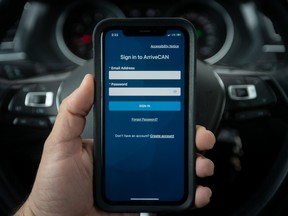‘I’m here to tell the truth, but I’m very concerned that if I tell the truth here, I’m going to lose my job’
Article content
OTTAWA – A government bureaucrat who worked on the controversial ArriveCan app said she has felt pressured to blame two suspended civil servants for the mess and compared the app to the sponsorship scandal in testimony before MPs Wednesday.
Diane Daly, who worked on the procurement but insisted she had no decision-making authority, said she was called into an interview with Canada Border Services Agency where she felt it was clear she was being asked to blame Antonio Utano and Cameron MacDonald.
Advertisement 2
Article content
Utano and MacDonald were suspended after the CBSA conducted an internal review of their actions in the awarding of the ArriveCan contract to GC Strategies. The pair have disputed the report’s finding and insist they are being unfairly blamed for what happened with ArriveCan.
Daly told MPs she believes she is now suspended because she wouldn’t blame Utano and MacDonald.
“I never saw Mr. MacDonald or Mr. Utano do anything nefarious.” she said. “I am currently on administrative leave from public works. I believe this is because CBSA and public works did not get the negative narrative expected about two former bosses at CBSA.”
She asked for the same consideration as Allan Cutler, a whistleblower who first raised the alarm about the sponsorship scandal in the early 1990s.
“I’m here to tell the truth, but I’m very concerned that if I tell the truth here, I’m going to lose my job.”
Daly said she was seconded to the CBSA to clear a backlog in procurement in 2018 and transferred back to the public works department in 2023.
Recommended from Editorial
Article content
Advertisement 3
Article content
After initially resisting, Kristian Firth, one of two owners of GC Strategies, named Daly before the House of Commons as the person who worked with him to design a contract that the company later won.
She said she has no idea why Firth named her and the limits of her job prevented her from taking the steps Firth said she did. She said she had no technical knowledge and simply processed procurements to ensure contractors were paid for the work they did.
“Any and all decisions were not mine to make. I had no access or no right to make decisions,” she said.
The CBSA developed ArriveCan during the pandemic. It initially required travellers to provide their contact information and information on where they would be quarantining to border officers, which was then passed along to provincial health officials who could follow up.
Later it was made mandatory and travellers had to use it to provide vaccination information. The app malfunctioned at one point sending thousands of travellers into quarantine.
In a damning report, the Auditor General found contracts for the app were poorly documented with little justification for the decision to award it as a sole-sourced contract. The Auditor determined the app cost at least $60 million.
Advertisement 4
Article content
More to come …
National Post
Get more deep-dive National Post political coverage and analysis in your inbox with the Political Hack newsletter, where Ottawa bureau chief Stuart Thomson and political analyst Tasha Kheiriddin get at what’s really going on behind the scenes on Parliament Hill every Wednesday and Friday, exclusively for subscribers. Sign up here.
Our website is the place for the latest breaking news, exclusive scoops, longreads and provocative commentary. Please bookmark nationalpost.com and sign up for our daily newsletter, Posted, here.
Our website is the place for the latest breaking news, exclusive scoops, longreads and provocative commentary. Please bookmark nationalpost.com and sign up for our politics newsletter, First Reading, here.
Article content









